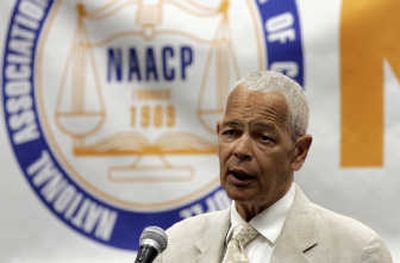NAACP panel urges better health care access

Unequal health care was the big theme Saturday at the 98th annual NAACP convention as delegates descended on Cobo Hall in Detroit.
Despite advances in overall health care, blacks suffer disproportionately when it comes to access to quality treatment, said panelists on a health forum inside the Detroit convention center.
And NAACP Chairman Julian Bond signed a pledge that calls for better access to health care, according to a news release from the AARP.
“The No. 1 reason why we’re dying at higher rates is because we’re less likely to have access to health care,” said Myisha Patterson, who has worked on community health issues for the NAACP.
About 45.8 million Americans are uninsured, half of them blacks or other minorities, according to FamiliesUSA, a consumer advocacy group.
Ron Pollack, the group’s executive director, said during the panel discussion that an even greater number, 85.2 million, have lacked health insurance at some time within the past two years.
Among whites, 24 percent have lacked health insurance at some point within the past two years. For blacks, the number is 43 percent.
Unless changes are made, “it’s likely to get worse. … Health care costs are rising at an enormous rate,” Pollack said.
James Rawlings, executive director of community health at Yale New Haven Hospital in Connecticut, gave a presentation on the status of blacks’ health in his state.
While Connecticut is one of the wealthiest states in the country, in parts of it health care is at Third World levels, he said.
One problem, he said, is that blacks sometimes rely on emergency rooms for treatment rather than dealing with doctors in office settings. According to one survey, about 2 percent of whites said they go to emergency rooms when they’re sick, compared with about 14 percent of blacks.
Rawlings and others on the panel said the Tuskegee experiment of the 1930s has lingered in the minds of many blacks, making some of them suspicious of hospital and government efforts to help them.
Patterson said the NAACP is working to reduce by 50 percent the numbers of blacks who are uninsured.
Also, the civil rights group has a five-point health plan, focusing on access to health care, HIV/AIDS, respiratory diseases, mental health, and obesity.
The NAACP convention, in Detroit this year, continues through Thursday.